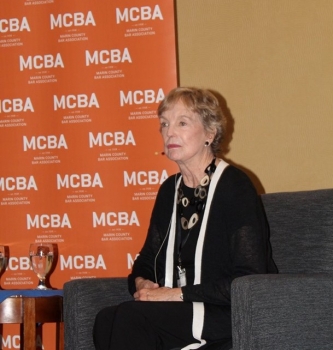In the News
News
Oct 01, 2019
SEPTEMBER 2019 LUNCHEON RECAP
MCBA Membership Luncheon Report: A Conversation with Retired California Supreme Court Justice Kathryn Werdegar
Oct 01, 2019
By Greg Brockbank
At the September 25 membership luncheon, MCBA was honored to welcome recently retired California Supreme Court Justice Kathryn Werdegar, a long-time Ross resident who served on the Court for 23 years after Governor Pete Wilson appointed her in 1994. MCBA Board member Marie Barnes introduced and interviewed Justice Werdegar.
Justice Werdegar entered law school at Boalt Hall (now the Berkeley School of Law), where despite being one of only two women in the class, she was elected the first woman Editor-in-Chief of the Law Review. When her husband got a job in Washington, D.C., she transferred to the George Washington University School of Law, where she was valedictorian. She then went to work for the Civil Rights Division of the U.S. Justice Department in 1962, during the Kennedy Administration, because of her interest in civil rights.
When she and her husband moved to California, she was taken aback by the lack of opportunities for women in law firms. She commented how circumstances probably directed her where the work suited her well, first as the Academic Dean of USF School of Law, then as a research attorney at the First District Court of Appeal, and then as a senior staff attorney for Justice Ed Panelli on the California Supreme Court. In 1991, Governor Pete Wilson appointed her to the First District Court of Appeal, still very much an old boys’ club, where she was the sole woman. Three years later, Governor Wilson appointed her to the California Supreme Court. She noted how Supreme Court Justice is not a job you apply for and in an unusual move, not repeated since, Governor Wilson made public his list of finalists for the Court, perhaps as a political trial balloon or perhaps as a consolation prize for the runners up.
Well before she took her seat on the high court, it had been shaken up by the “retention” election that failed to retain three of the justices on the Rose Bird Court – which was highly unusual – because of the public perception that too many of them were too anti-death penalty. Then-Governor George Deukmejian, a Republican, had the rare opportunity to appoint three new justices at once, giving the court a conservative tilt for years to come, with a mix of Republican and Democratic appointments since then. Justice Werdegar commented that she believes all of the justices feel that they are interpreting the law rather than making political decisions, noting that of course each of them brings their own life experiences to that task. She pointed out that the California Supreme Court had a majority of women (until she retired), is the most racially diverse state supreme court in the country, and is the most followed court in the country.
Asked about her most memorable decisions (many of which were dissents), she cited the case of Merrill v. Navegar, a gun manufacturer liability case. It arose from the horrific mass shooting at 101 California Street in San Francisco, where a disgruntled client armed with several semi-automatic weapons killed eight people at his law firm. In discussing the case, Justice Werdegar offered some behind-the-scenes insight into the opinion-writing process. She said that the Court has a draft opinion even before oral arguments. She was assigned the majority opinion in Merrill. As is typical, justices make additions or deletions in the draft opinion in order to tailor it to attract particular votes. That process took longer than usual in this case, and oral arguments, which rarely change the outcome of any votes, in fact changed Justice Werdegar’s mind, and she ultimately authored the dissent instead of the majority opinion. Statutory law immunizes gun manufacturers from product defect liability but an almost overlooked theory of “negligent marketing” provided the basis for her dissent. She pointed out that this theory recently received new life in a decision in Connecticut, which pleased her.
Asked about the increasing role of technology, she first responded that much of it passed her by, but she did assure the audience that the institution itself keeps up to date and takes advantage of modern technology, even if the older justices rely more on staff.
Asked about the Court’s review of statewide ballot initiatives, she said they are always a challenge, because they are often poorly drafted and vetted, and yet one hates to disregard the will of the people and throw them out. Death penalty initiatives have come before the Court several times, reflecting the ongoing division in the state between those who want to abolish the death penalty and those who want to speed it up; in the most recent case, each faction had competing initiatives on the ballot. Since no initiative to abolish it has succeeded, she is certain that we’ll continue to see them.
Justice Werdegar also made an impassioned plea for civility, which seems to be diminishing as attorneys (and people in general, especially politicians) increasingly feel like they have to be insulting in order to be seen as forceful. She reminded the audience that we can retain our ethics and dignity, be civil, and still continue to be highly successful.













